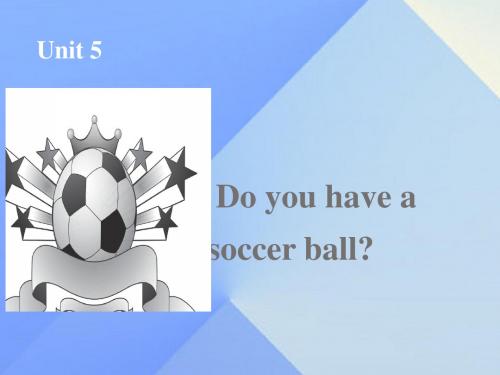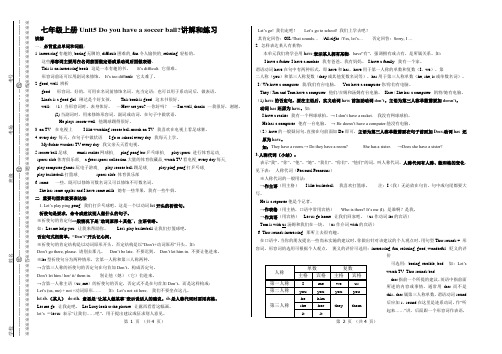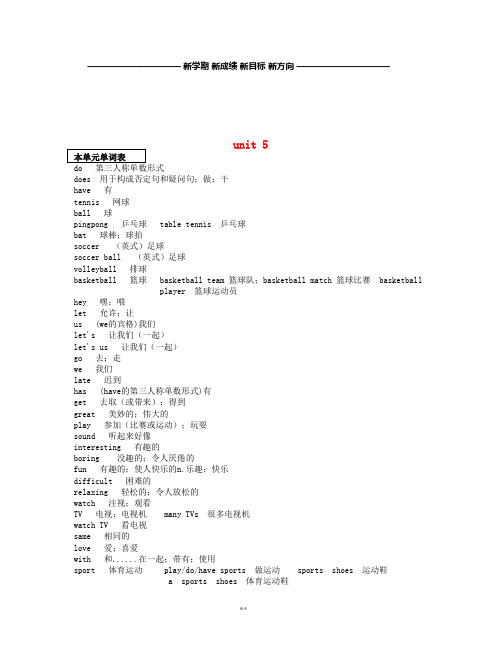Unit 5 Do you have a soccer ball
unit5do you have a soccer ball1

Do you have a soccer ball?1. 怎样表达某人有某物:※当你从地上拾到一支钢笔,你会情不自禁地问Whose pen is it?这是谁的钢笔?Is it hers?是她的吗?前两个单元我们学了用物主代词表示所属关系,本单元我们将学会用have表示所属关系,have"有",强调拥有或占有,是所属关系。
如:I have a father. I have a mother. I have a family.谓语动词have在句中有两种形式,即have和has。
have用于第一人称的单数和复数(I、we),第二人称(you)和第三人称复数(they或其他复数名词等),has用于第三人称单数he, she, it或单数名词。
I / We have a computer. You have a computer. They / Jim and Tom have a computer. Kate / She has a computer.2. 动词have(有)的一般现在时:(1)have是及物动词(vt.),后面接宾语,意为"有、拥有"。
用于肯定句时,如果主语是第三人称单数,have要变为has。
变为一般疑问句时,要在句首加助动词do或does(主语第三人称单数时为does),加does后动词还原,即用动词have。
如:I have a brother. She has a story book.(2)have的否定句,要在主语后,实义动词前加助动词don't或doesn't。
主语为第三人称单数需要加does,加does后动词还原。
如:I have a racket. I don't have a racket. He has a computer. He doesn't have a computer.3. there be与have的区别:它们都表示"有"的意思,但句型There is/ are ...表示某处有某物或某人,强调的是一种客观存在;但是have强调的是拥有或占有,主语一般是名词或代词,与主语是所属关系。
新素质方略七年级英语上册Unit5Doyouhaveasoccerball

B. 本题考查的是实义动词一般疑问句,由于主语是you,此处只能用do.
Words
soccer n.
名词,意为“(英式)足球”。也可以说soccer ball。
Expressions
小练习:单项选择
-Let’s play volleyball! -.
A. Thank you
B. Yes, please
C. That sounds good. D. That sound good.
C. A、B不符合题意,C 、D两项sound的形式能与主语that相对 应的是C
get to意为“到达”,get down意为“下来;落下”,get up意为“起床”,只有B项 get on
with sb意为“与某人相处”。因此选B。
Expand
真题演练
3.______your friends have a wonderful journey?
A. Are
B. Is
C. Do
Translations
Helen: Bill has it. 海伦:比尔有。 Cindy: Oh, yeah. And do you have your jacket? 辛蒂:哦,好的。那你穿你的夹克吗? Helen: Oh, no, I don’t. It’s on the chair. Let me get it. 海伦:噢,不,我没有。它是在椅子上。让我去取吧。 Cindy: And your hat, too! 辛迪:还有你的帽子! Helen: OK, I have my jacket and hat. Let’s go. 海伦:嗯,我拿了我的夹克和帽子。我们走吧。
人教版英语七上 U5 Do you have a soccer ball 讲义

Unit5 Do you have a soccer ball?一、重点词汇及拓展1. have v.(1) 有e.g. I have a pen. 我有一只钢笔。
(2) 吃;喝e.g. I have breakfast every day. 我每天吃早饭。
(3) 经历e.g. have a good time 玩得开心;过得愉快(4) 上课e.g. We have English lessons every day. 我们每天上英语课。
(5) 举办e.g. Mark has a party. 马克举办了一个派对。
(6) 得…病e.g. He has a cold and a headache. 他感冒和头疼。
2. let v.允许;让let’s = let us 让我们let sb. do sth. 让某人做某事let sb. not do sth. 让某人不要做某事e.g. Let’s have a party tonight! 让我们今晚举办一个派对吧!make sb. do sth. 使某人做某事e.g. The movie makes me miss my mother. 这部电影使我怀念我的妈妈。
3. go v.去;走go to +地点去某地go to school 去学校go here/there/home 去这儿/去那/回家go shopping 去购物go swimming 去游泳go hiking 去远足go skating 去轮滑go boating 去划船4. lateadj. 迟的;晚的be late for school 上学迟到be late for class 上课迟到1be late for work 上班迟到adv. 迟地;晚地later adv. 后来;以后e.g. Three days later, he found his father. (句中有段时间+later,句子用一般过去时)三天后,他找到了他的爸爸。
Unit5 Do you have a soccer ball讲解和练习

第 1 页 (共4 页) 第 2 页 (共4 页)学校 姓名 班级 考场 考号---------------------------------○密------------------ -------------------○封----------------------------- -- --○线----------------------------※※※※※※※※※※※※※※※答※※※※※※※※※※※※※※※※※※题※※※※※※※※※※※※※※※※线※※※※※※※※※※※※※七年级上册Unit5 Do you have a soccer ball?讲解和练习讲解一.必背重点单词和词组:1. interesting 有趣的, boring 无聊的, difficult 困难的, fun 令人愉快的, relaxing 轻松的。
这些形容词主要用在名词前面做定语或系动词后面做表语。
This is an interesting book. 这是一本有趣的书。
It’s difficult. 它很难。
形容词前还可以用副词来修饰。
It’s too diffi cult. 它太难了。
2. good, well 辨析good 形容词,好的,可用在名词前修饰名词,充当定语;也可以用于系动词后,做表语。
Linda is a good girl. 琳达是个好女孩。
This book is good. 这本书很好。
well :(1)当形容词时,表身体好。
—How are you? —你好吗? —I'm well, thanks. —我很好,谢谢。
(2).当副词时,用来修饰形容词,副词或动词,在句子中做状语。
He plays soccer well. 他踢球踢得很好。
3. on TV 在电视上 I like watching soccer ball match on TV. 我喜欢在电视上看足球赛。
七年级英语上册 Unit 5 Do you have a soccer ball(单词+重点句型)语法解析

——————————新学期新成绩新目标新方向——————————unit 5does 用于构成否定句和疑问句;做;干have 有tennis 网球ball 球pingpong 乒乓球 table tennis 乒乓球bat 球棒;球拍soccer (英式)足球soccer ball (英式)足球volleyball 排球basketball 篮球 basketball team 篮球队;basketball match 篮球比赛 basketball player 篮球运动员hey 嘿;喂let 允许;让us (we的宾格)我们let's 让我们(一起)let's us 让我们(一起)go 去;走we 我们late 迟到has (have的第三人称单数形式)有get 去取(或带来);得到great 美妙的;伟大的play 参加(比赛或运动);玩耍sound 听起来好像interesting 有趣的boring 没趣的;令人厌倦的fun 有趣的;使人快乐的n.乐趣;快乐difficult 困难的relaxing 轻松的;令人放松的watch 注视;观看TV 电视;电视机 many TVs 很多电视机watch TV 看电视same 相同的love 爱;喜爱with 和......在一起;带有;使用sport 体育运动 play/do/have sports 做运动 sports shoes 运动鞋a sports shoes 体育运动鞋them (they的宾格)他(她、它)们only 只;仅like 喜欢;喜爱easy 容易的;不费力的after 在......以后class 班级;课(近义词:lessen);等级;类别;阶段classmate 同班同学 roommate 室友 workmate 同事 deskmate 同桌schoolmate 校友Bill 比尔(男名)on的用法,详见unit4【解析】on可以表示“通过;使用……方式”,后面通常接表示通信工具的名词。
新目标英语七年级上册_unit_5_Do_you_have_a_soccer_ball B

let sb. do sth让某人做某事
Grammar Focus:
Do you have a baseball?
Yes, I do./ No, I don't. I have a volleyball.
Do you have a ping-pong bat?
where's=where is ,对地点提问,后接单数名词。
Let's 是 let us的缩写。 let’s包括说话人在内,let us不包括说话人在内。 本句是以let开头的祈使句,结构为“Let’s do sth.”, 意为“咱们……吧”,常用于提出建议。如: Let’s play basketball.
Yes, I do./ No, I don't. I have a ping-pong ball. Yes, they do./ No, they don't. They have a volleyball.
Do they have a basketball?
Does she have a tennis ball? Does he have a soccer ball?
× ×
×
1b Listen and circle the words you hear.
ping-pong bat
volleyball
soccer ball
ping-pong ball
Listening
A: Do you have a ping-pong bat?
B: Yes, I do.
A: Do you have a ping-pong ball?
Unit 5 Do you have a soccer ball 知识点归纳-七年级上册英语

人教版新目标七上英语单元知识点归纳Unit 5 Do you have a soccer ball?重点词汇tennis/'tenis/ n. 网球bat /bæt/ n. 球棒;球拍soccer ball (英式)足球volleyball/'vɔlibɔ:l/ n. 排球basketball/'ba:skitbɔ:l/ n. 篮球late/leit/ adj. 迟到great/greit/ adj. 美妙的;伟大的play/plei/ v. 参加(比赛或运动);玩耍sound/saund/ v. 听起来好像interesting/'intrəstiŋ/ adj. 有趣的boring/'bɔ:riŋ/ adj. 没趣的;令人厌倦的fun/fʌn/ adj. 有趣的;使人快乐的n.乐趣;快乐difficult/'difikəlt/ adj. 困难的relaxing/ri'læksiŋ/ adj. 轻松的;令人放松的watch/wɔtʃ/ v. 注视;观看same/seim/ adj. 相同的easy/'i:zi/ adj. 容易的;不费力的class/kla:s/ n. 班级;课classmate/'kla:smeit/ n. 同班同学重点短语:a tennis bat 一个网球拍play basketball 打篮球baseball bat 棒球棒have a soccer ball 有一个足球play soccer 踢足球with our friends 和我们的朋友一起have a ping-pong ball 有一个乒乓球play ping-pong 打乒乓球have a volleyball 有一个排球play volleyball 打排球at school 在校,上学play sports 做运动watch TV 看电视in my bag 在我的包里be late 迟到on TV 电视上必背典句:1. Do you have a soccer ball? 你有一个足球吗?2. Does he/she have a ping-pong ball?他/她有一个乒乓球吗?3. Do you play sports with your classmates? 你和你的同学一起做运动吗?4. Let’s play soccer together! 我们一起踢足球吧!5. How many sports do you like?你喜欢多少种运动?6. I like playing soccer and basketball. 我喜欢踢足球和打篮球。
七年级英语上册 Unit 5 Do you have a soccer ball(第5课时)

Unit 5 Do you have a soccer ball? 学习内容学习目标知识与技能:1.复习掌握本单元单词和短语2.熟练掌握提建议的句型Let's--3.会正确运用Do you have…?Does he/she have…?来谈论物主关系4.学会写某人所拥有物品的短文过程与方法:通过听,说等一些活动培养良好的听力习惯和能力,再通过通过独学和小组合作,学会使用本单元重点句型。
情感态度与价值观:每个人要有自己的爱好。
重点难点1.会正确运用Do you have…?Does he/she have…?来谈论物主关系2.学会写某人所拥有物品的短文学具准备录音机、磁带、课本,导学案学习形式教师导学,学生小组合作学习学习过程学生学案一、回顾反馈预习提纲:有_________ 乒乓球________________ 排球___________ 篮球____________玩,打____________ 听起来____________ 运动____________ 我们___________大量的_________ 更多的____________ 班级____________有趣的_________令人生厌的___________ 令人愉快的________ 困难的___________轻松的__________ 美妙的____________ 收藏品____________ 但是教师导案谈话导入新课:回顾复习旧知识生学习目标老师检测预习组长汇报老师巡视检查自主完成全员参与补充内容板书课题:。
英式足球_____________ 网球拍____________ 看电视___________做运动___________ 每天____________二、明确目标学案导学学生自渎目标明确学习目标三、自主学习合作探究1.自读Part3,排序2.小组讨论答案,并讨论汉语意思.3.小组为单位展示答案.4.两人一组练习对话,小组展示.5.背诵对话.四、展示提炼拓展延伸小组讨论如何翻译以下句子.1.你有乒乓球吗?不,我没有.2.他有一个足球吗?是的,他有.3.他们有一台电脑吗?是的,他们有.五、达标测试效果反馈:(一)根据句意及首字母提示补全单词1.Do you have a tennis r__________?2.In our school,we have m_______ clubs.3.We w_________ TV every day.4.These questions are very d_____________.5.Please j________ us soon.6.We have many c________:volleyball,basketball,ping-pong(二)翻译短语1.打排球____________________2.玩电子游戏__________________________3.看电视___________________4.踢足球______________5.做运动6.听起来很有趣7.体育俱乐部_____ ___ 8.那么难______________________ 9.每天___________________ 10.大量的体育收藏品___________________11.8个网球拍_________________ 12.在电视上收看它们__________________(三)选择1._________you have a pen? A.do B.does C.Do D.Does2.—Do Lucy and Lily have a baseball? —Yes,____________.A.she doesB.she hasC.they doD.they have3.—Let's play basketball. —No,_____________.A.it's boringB.it's interestingC.it's goodD.it's fun4. Let's __________TV. A.look B.look at C.seeD.watch5. Do you play _______?A.basketballsB.a basketballC.basketballD.the basketball6. Let's _____________.A.play ping-pongB.to play ping-pongC.playing ping-pongD.play the ping-pong7. Let_______ play sports. A.we C.is D.has(四)用所给动词的正确形式填空.1. Let's ___________ (play) soccer.2. That ___________ (sound) boring.3.—______she _______(have) a phone? -----No,sh e doesn't4. Sue _________(not have) a great sp orts collection.(五)句型转换1. I have a soccer ball.(改为一般疑问句)课后反思:。
- 1、下载文档前请自行甄别文档内容的完整性,平台不提供额外的编辑、内容补充、找答案等附加服务。
- 2、"仅部分预览"的文档,不可在线预览部分如存在完整性等问题,可反馈申请退款(可完整预览的文档不适用该条件!)。
- 3、如文档侵犯您的权益,请联系客服反馈,我们会尽快为您处理(人工客服工作时间:9:00-18:30)。
Unit 5 Do you have a soccer ball?Section A(1a-2d)听说课Learning Goals知识目标:1. 能争取使用下列词汇(Curriculum words)do, have , ball, tennis, volleyball, basketball, ping-pong , bat , soccer, soccer ball2. 能争取使用下列句型(Useful drills)---Do you have a ping–pong ball? ---Yes, I do./No, I don’t.---Does he/she have a ping-pong bat?---Yes, he/she does./No, he/she doesn’t语言功能:能够听懂询问是否有某物的句子,并能用do和does引导的一般疑问句询问某人是否拥有某物。
学习策略:1预测阅读文章的大意,2将所学的单词按语义场分类:体育运动词汇,描绘性词汇。
情感态度:了解和体育运动有关的英语知识,并培养对运动的热爱Step1 Preview一、P25写出球类名词的英文名称并翻译下列动词短语。
1.篮球__________2.棒球___________3.排球__________4.足球__________5.乒乓球________6.网球__________7.打乒乓球________________8.打篮球________________9.踢足球_________________10.打棒球___________________11.打网球___________________12.打排球__________________二、P27翻译句子1.你有乒乓球吗?是的,我有。
___________________________________.2.你有乒乓球拍吗?不,没有。
___________________________________.3.他有足球吗?是的,他有。
___________________________________.4.她有排球吗?是的,她有/不,没有。
___________________________________.Step 2 Warm up and lead in1.Show a picture and make a conversation with students. And then Show the students theconversation and the pictures below to students. And have students practice it:T: What’s this in English?S: It’s a volleyball.2. Play a game named ―Who has the best memory?‖ Show Picture 1 to students and have themwatch it carefully and then show them Picture 2 with some things covered. Then let them say the covered things out.3.(1a)Have students match the words with the things in the picture.Check the answer s with students.【设计意图】用旧的句型导入新词。
通过这部分的练习学生能够熟练地掌握新的词汇。
4. Show students a volleyball and make the conversation like this:T: I have a volleyball. Do you have a volleyball?Help students to answer:Yes, I do. I have a volleyball./ No, I don’t. I don’t have a….T hen s how the pictures of some things in 1a and have students practice:S1: I have a …. Do you have a …?S2: Yes, I do. I have a…/ No, I don’t.I don’t have a …【设计意图】在学生熟练掌握词汇的情况下,引入新的句型。
并及时的将句型付诸于口头练习。
是学生能够熟练的掌握新句型,并为下面的听力做好准备。
Say ―Now let’s listen to somesimilar conversations‖Step 3While-l isten ing1. Listening for the main ideaThe main idea of the two conversations is about_______A. themselves.B. what the things areC. what they have and they don’t have.4.F ill in the blanks.Boy1:Do you ____ a ping-pong bat?Boy2:Yes,I ______.Boy1:_____ you have a ping-pong _____?Boy2:______,I don’t.【设计意图】在学生掌握新句型的基础上,听听力,降低了听力的难度。
能够加深学生对句型的印象。
Step4 After-listeningG et the students read after the tape ,pay attention to the pronunciation and intonation .【设计意图】培养学生的语感,掌握正确的发音和语调。
Step5 Presentation and practice1.Teacher has a student with a volleyball stand up and says: ―He has a volleyball.‖ Then points to another student without a volleyball and asks: ―Does he have a volleyball?‖ Help students to answer: Yes, he does. He has a volleyball. / No, he doesn’t. He doesn’t have a volleyball. Have students pay more attention to ―has‖.2. (2c)Show the pictures below to students and have them practice the drills.【设计意图】第一人称练习熟练后,及时的引入第三人称的练习。
学生能够对比记忆和掌握。
效果很好。
同时让学生在操练中掌握语言知识,形成语言技能。
Step6 Listen(2a-2d)1. Listen to the conversations and number the pictures2. Listen again .Match the pictures in 2a with the balls.3. Listen to the tape again and fill in the blanks:Jane ____________a baseball.Paul___________a soccer ball.Dale___________a volleyball.Mike ___________a basketball.【设计意图】在熟悉句型以后,我们进行听力练习。
降低了听力的难度,增加了学生的自信心。
Step 7 Role play the conversation in 2d.1. Ask and answer questions about the conversation .(1)Does Cindy the baseball?__________________(2)Where is Helen’s Jacket ?___________________2. Put the conversation into Chinese.3. Role-play the conversation in pairs .Then go to the front of the classroom and perform it to thewhole class.【设计意图】充分利用听力材料训练学生听的能力和培养学生的语音语调。
Step 8 Inquiry into knowledge by translation1.Does he have a ping-pong ball? Yes, he does./No, he doesn’t.___ ________________________) a soccer ball. (我没有足球)He doesn’t ___________(have) a ping-pong ball.(他没有乒乓球)(1)句中的____和_____是构成疑问句和否定句的助动词,位于疑问句句首。
(2)构成否定句时,do not缩写为___________does not缩写为:___________构成否定句。
(3)do作实义动词,意为________Eg:I do my homework every day.(我每天做作业)改为疑问句:Do you do your homework every day?(你每天都做你的作业吗?)have v. 本单元中的意思为“有”。
表达某人有某物:※前两个单元我们学了用物主代词表示所属关系,This is my father.(这是我的父亲)。
Is thisyour pen?(这是你的钢笔吗?)。
本单元我们将学会用have表示所属关系,have“有”,强调拥有或占有,是所属关系。
如:I have a soccer ball. I have a ping-pong ball.我有一个足球。
我有一个乒乓球。
(1)谓语动词have在句中有两种形式,即_____和_____. have用于第一人称的单数和复数(I、we),第二人称(you)和第三人称复数(they或其他复数名词等),has用于____________he, she, it或单数名词。
